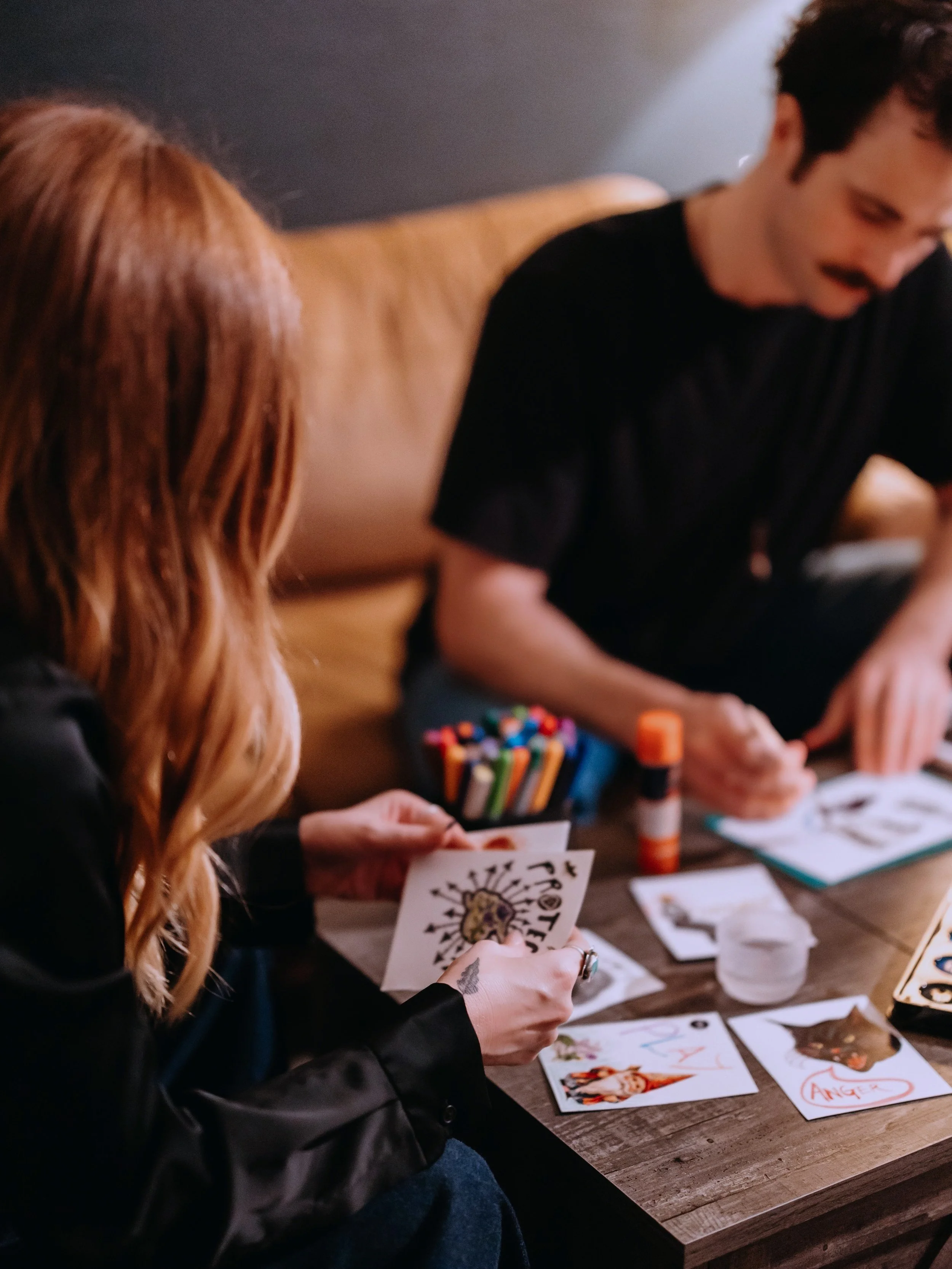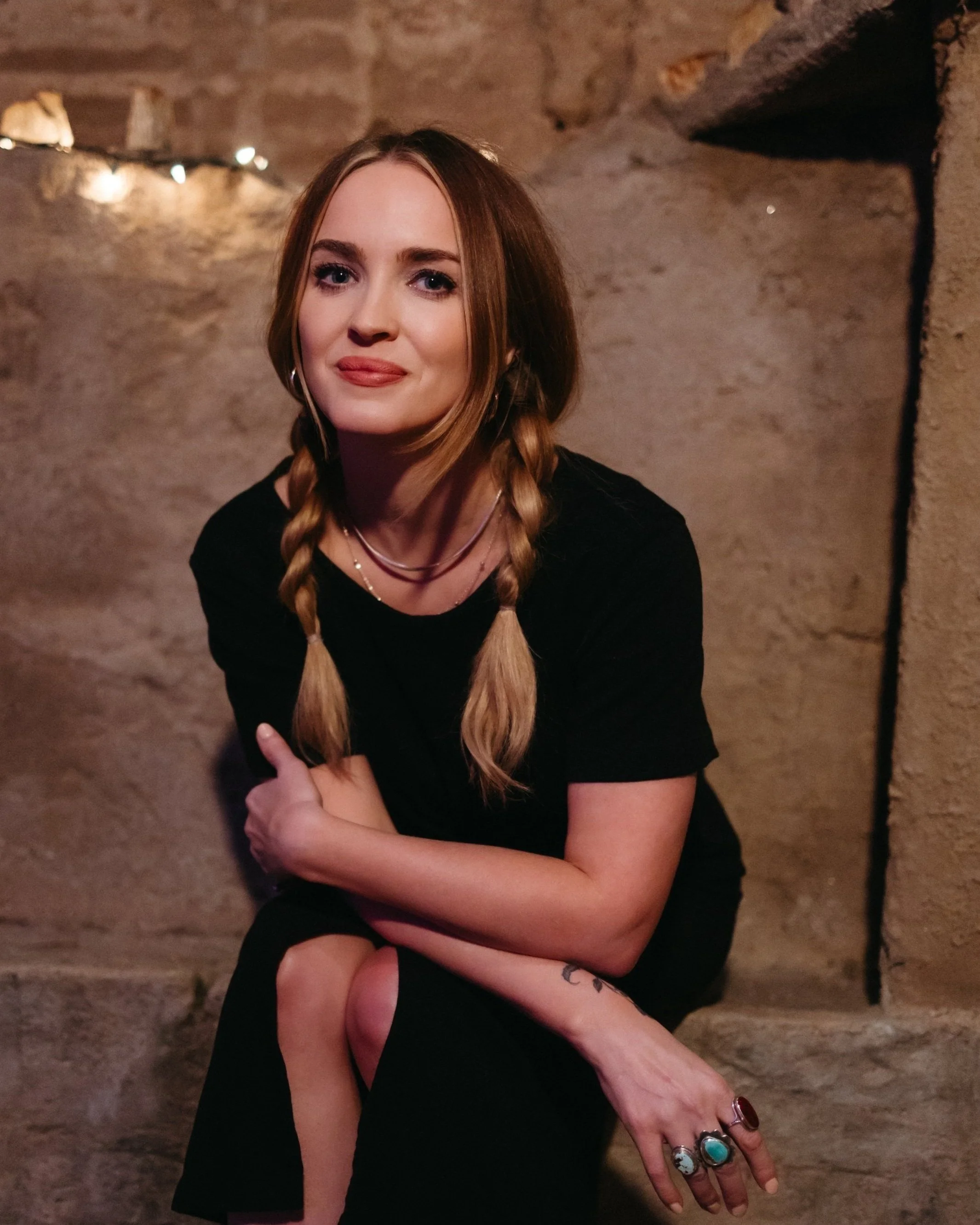INSIGHT-ORIENTED
INDIVIDUAL THERAPY
In-Person + Virtual in Tucson, Arizona
Self-Expression.
Honesty.
Connection.
Meaning.
E R I N L O V E
LICENSED ASSOCIATE COUNSELOR
ARTIST
I’m Erin.
I am a therapist and artist located in Tucson, Arizona.
I love working with highly sensitive individuals, neurodivergent minds, artists, introverts, intuitives, and outsiders of all kinds.
I believe there is a place for you in this world, even when it feels like it wasn’t designed with you in mind at all.
Using a trauma and attachment informed approach, I strive to create an atmosphere of safety, consistency, and containment, while simultaneously promoting risk-taking and emotional honesty.
My practice is queer-affirming, non-pathologizing, and collective liberation oriented.
Specialties
-

Therapy for Artists
-

Highly Sensitive + Neurodiverse
-

Life Transitions
-

Existential Concerns
WHO I WORK WITH
I tend to work best with adults who are ready and open to engaging in a collaborative, hands-on therapeutic process. Many of my clients are introspective, unconventional, creative, and drawn to embodied, emotionally expressive approaches like journaling, guided meditation, ritual, collage, working with clay, and creative writing. They often identify as introverts, outsiders, or people who feel out of step with mainstream expectations, and may be navigating self-doubt, burnout, or patterns of over-functioning.
People who connect with my style are usually exploring questions of identity and re-evaluating their life direction and relationships. They’re looking for a therapist who can offer structure without rigidity, respect their complexity and depth without pathologizing it, and provide a space where they can reflect, be honest with themselves, and move toward meaningful change.
Therapeutic Approach.
I use an Insight-Oriented approach to counseling that integrates Experiential and Humanistic therapy modalities.
INSIGHT-ORIENTED COUNSELING
HOW IT WORKS
I draw from a range of therapeutic approaches based on your learning style and comfort level, with a foundation in insight-oriented work. Together, we explore how early experiences continue to shape the way you relate to yourself, others, and the world around you. Sessions are intuitive and relational, with an emphasis on slowing down, listening inward, noticing the body’s cues, and using expressive arts to give shape to your internal experience. Therapy becomes a space to reconnect with what feels true, soften patterns that no longer serve you, and support a more integrated sense of self.
This Includes Elements Of:
-
Parts Work, also known as Internal Family Systems (IFS), is a therapeutic approach based on the understanding that the mind is made up of different “parts” or subpersonalities, each with its own perspective, emotions, and protective strategies. These parts often form in response to early experiences, relationships, or trauma, and they shape how you think, feel, and relate to others. You might notice them as conflicting urges, inner voices, or recurring emotional patterns. Importantly, all parts have a reason for existing; none are inherently “bad.” Even the ones that feel disruptive or overwhelming originally formed to help you cope or survive, though over time, they may get stuck in rigid roles that create distress or self sabotage.
Parts Work helps you turn toward these inner experiences with curiosity and compassion rather than judgment or avoidance. In therapy, we gently explore the fears, needs, and intentions of each part, especially those that seem to be in conflict or protect against deeper pain. This process creates space for internal dialogue, healing, and integration.
We may use creative tools like guided visualizations, expressive art, journaling from a part’s perspective, or somatic tracking to explore where parts show up in the body. These practices make your inner world more tangible, especially when words fall short, and can ease tension, reduce overwhelm, and support a deeper sense of clarity and self trust.
-
As both a licensed therapist and practicing artist, I bring creative expression into therapy to support deeper self exploration and honor the many ways we communicate who we are.
While not a certified expressive arts therapist, I am a certified SoulCollage® facilitator, and this method plays a central role in my work. SoulCollage® invites you to create a personal deck of collage cards that reflect different aspects of your inner world, parts of self, archetypes, relationships, or energies you’re navigating. It’s a useful way to give shape to nuanced feelings and experiences that may be hard to express otherwise.
I often integrate expressive arts with Parts Work, also known as IFS, to help externalize and engage with inner dynamics more tangibly. When paired with tools like collage, clay, or poetry, the IFS process often becomes easier to understand and relate to.
Creative processes in therapy can also support nervous system regulation, offer relief from overwhelm, and help track emotions in a slower, more embodied way. Nonverbal expression becomes another valid and powerful language for communicating what’s within, especially when talking feels too hard or limiting. This multisensory, grounded approach fosters emotional clarity and connection, making space for parts of you that may have otherwise gone unheard.
-
Existential therapy is a reflective, depth-oriented approach that explores the core questions of human life—meaning, identity, freedom, and the reality of our limitations. Rather than viewing distress as something to eliminate, this approach sees it as a doorway into deeper understanding. Feelings like anxiety, sadness, or emptiness are honored as valid responses to life’s uncertainties. In therapy, we explore what matters to you, how you relate to choice and responsibility, and what it means to live authentically in the face of change, loss, or the unknown.
This work is less about symptom reduction and more about deepening connection—to yourself, to others, and to life. Together, we reflect on the patterns and beliefs shaping your experience, and explore how you might move through stuckness with greater honesty and intention. Whether you're navigating a transition or questioning the direction of your life, existential therapy offers space to clarify your values, make meaning of your struggles, and find a path that feels more true to who you are.
-
Mindful Self Compassion (MSC) combines mindfulness, the practice of being present, with self compassion, encouraging us to respond to our own suffering with kindness rather than judgment. By meeting difficult emotions and thoughts with warmth and understanding, MSC helps reduce self criticism and builds resilience, creating a more supportive inner dialogue during challenging times.
Through gentle awareness and acts of self kindness, MSC cultivates a recognition of our shared humanity and common struggles. This awareness softens the inner critic, promotes emotional balance, and fosters connection, acceptance, and inner strength, providing a steady foundation for greater well being and personal clarity.
-
Narrative therapy is an approach that understands people’s lives as shaped by the stories they tell about themselves. It supports exploring and reframing these narratives, helping to separate you from problems and create room for new perspectives. By examining how dominant stories develop—often influenced by culture, family, or past experiences—you can identify limiting beliefs and consider alternative, more constructive meanings. This approach highlights your capacity to shape your own life story with intention and clarity.
Mythopoetic perspectives in therapy use myths, symbols, and archetypal stories to deepen understanding of personal experience. These narratives provide meaningful metaphors for common human struggles and transitions, linking individual challenges to broader themes. Engaging with mythopoetic material can help access insights beyond everyday language, enriching self-reflection. Combined with narrative therapy, this approach encourages viewing your life as a story where new roles and possibilities can emerge.

“To be what one is, is to enter fully into being a process.”
Carl Rogers, On Becoming A Person: A Therapist's View of Psychotherapy
THE PROCESS
Therapy looks and feels different for everyone. Depending on your needs, it might be a commitment lasting weeks, months, or years. For some, it becomes an ongoing part of a lifestyle focused on personal growth, connection, and emotional well-being.
-
The first stage of therapy focuses on ensuring the right fit between you and your therapist. Establishing a safe, supportive space is essential for sensitive work to unfold.
From there, we use a hands-on, creative approach to deepen your understanding of yourself—your strengths, challenges, and unique patterns.
During this stage, resistance to therapy often arises. While it can slow progress, exploring that resistance reveals deeply ingrained protective responses, offering valuable insight for growth.
-
‘Insight’ refers to a deepened awareness and understanding of yourself, a situation, or your feelings—often experienced as a sudden clarity that was previously out of reach.
Discomfort can be common during this phase, as facing repressed or difficult material may bring up painful emotions. As insight unfolds, you often gain a clearer understanding of your role in challenging patterns and dynamics.
Insight is a vital part of therapy, encouraging you to explore your inner world and make meaningful changes that honor your true needs.
-
The experience of growth unfolds uniquely for each person but often involves embracing vulnerability, acknowledging fears, and accepting personal responsibility.
As vulnerable feelings and defense mechanisms become understood within the context of your history, you can begin to recognize what changes are needed and start taking action.
With increased comfort in making changes, you’ll feel more confident and equipped to face future challenges with greater trust in yourself.
In this stage, many develop a clearer understanding of their needs, values, wounds, triggers, and boundaries, along with a stronger ability to advocate for themselves.
-
After experiencing progress, some people feel ready to conclude therapy, while others notice deeper layers of awareness that call for further attention. For those who wish to continue on, we may choose to keep working together, or I might refer you to a specialist with expertise in a modality suited to your current needs.
When therapy ends, it’s common to experience a range of emotions as you navigate life with increased awareness. Some feel ready to face challenges that once seemed overwhelming, while others experience a mix of relief and uncertainty.
Ups and downs are normal after therapy, but the tools and insights gained can offer ongoing support and guidance as you continue onward.

COUNSELING
SERVICES:
-
1:1 In-Person Therapy
I am currently not available for in-person sessions.

-
1:1 Virtual Therapy
I offer virtual sessions in the state of Arizona Monday through Friday.


Non-Clinical
SERVICES:
1:1 Creative Coaching Session
-
Non-Clinical Creative Coaching for Artists
Creative coaching sessions offer a dedicated space to reconnect with your artistic practice, whether you’re feeling creatively blocked, navigating self-doubt or comparison, or simply wanting more intentional time to focus on your work. While not therapy, these sessions provide supportive, non-clinical conversations that center your creative life.
In our sessions, we’ll explore what gets in the way, whether it’s self-doubt, fear of judgment, burnout, or lack of structure. Together, we will explore ways for you to re-engage. This might include hands-on creative practices during the session, conversation and reflection, or designing simple rituals to help you return to your work with more ease and intention.
-
As a practicing artist, I understand firsthand the emotional and practical challenges of making art. Before becoming a therapist, I earned a BFA in Illustration from the Pacific Northwest College of Art in Portland, Oregon, and spent my early adult years exhibiting work, taking commissions, curating shows, and participating in artist collectives.
Through years of maintaining my own practice and working alongside other artists, I know how disorienting and painful it can feel to be disconnected from your creative process. I also understand how essential that process can be when it serves as a means of expression, clarity, and connection. I take creative work seriously and approach it with respect.
Sometimes the goal isn’t to push through, but to find the path of least resistance, finding a way to start where you are, set clear intentions, and gradually rebuild momentum. With time and attention, small, incremental changes can often lead to renewed energy and direction.
-
Creative coaching can be helpful for a wide range of people, especially those navigating inner or outer blocks in their creative life.
It’s especially beneficial for:
Artists, writers, musicians, and performers feeling stuck, scattered, or disconnected from their practice
People in creative burnout who want to reconnect with curiosity, purpose, or enjoyment in their work
Those exploring a new creative identity or returning to creativity after a long break
Professionals in transition seeking more meaning, freedom, or expression in their work or daily life
Highly sensitive or neurodivergent creatives who need flexible, nonjudgmental support that honors their natural rhythms
Anyone longing for a more intentional relationship with their imagination, voice, or inner world—even if they don’t identify as “creative” in a traditional sense
SoulCollage® Session
-
SoulCollage® is a self-reflective process that uses intuitive collage-making to explore different aspects of the self. Developed by Seena B. Frost in the late 1990s, it offers a way to access personal insight through visual imagery. The practice is accessible to anyone, regardless of artistic skill, and emphasizes curiosity and discovery over aesthetics.
Participants create collage cards using found images, with each card representing a distinct facet of the self, such as emotions, roles, life stages, personality traits, or archetypes. Cards may also reflect important people, relationships, mentors, animals, or places with personal significance.
After making a card, participants are invited to give it a voice using simple, structured prompts, often beginning with “I am one who...” This helps uncover what that part of the self wants to express or bring into awareness.
Over time and with consistent practice, these cards form an evolving, personalized deck reflecting a multifaceted self.
-
As a certified SoulCollage® facilitator, I offer non-clinical sessions, meaning they are not psychotherapy and don’t involve diagnosis, treatment planning, or clinical documentation.
While the process can be meaningful and even therapeutic, it is not therapy. These sessions are designed to support personal reflection and creative exploration in a structured, low-pressure space. You’ll have the opportunity to connect with different parts of yourself through image-making and guided reflection, without entering a clinical framework.
-
Each 90-minute session includes all materials needed to create one personalized SoulCollage® card. This is what you can expect in a session:
Option to begin with a brief guided meditation (about 10 minutes) to help transition into a reflective and creative state.
Create your SoulCollage® card during the session using provided images and magazines. You are also welcome to bring your own images if you prefer.
After completing your card, we will spend time “voicing” it together:
I will offer guided prompts to help you speak from the perspective of your card.
I will transcribe your responses.
Alternatively, you can choose to journal your responses independently.
The “voicing” process helps externalize your experience by giving it form, language, and presence.
Time at the end to reflect on what emerged during the session.
Set a closing intention and discuss any insights or questions.
You leave with:
Your completed SoulCollage® card in a protective sleeve.
A printed copy of your transcription.
Facilitator offers ideas and resources to support building your own SoulCollage® deck at home.
SoulCollage® practice can be a meaningful ongoing way to check in with yourself and stay grounded in your inner guidance.
-
You don’t need to be an artist, just open to listening to your intuition and curious about yourself. This process is accessible and beneficial to a wide range of people, including:Highly sensitive, creative, or introspective individuals who feel more comfortable expressing themselves through images than through words alone.
People navigating transitions—such as grief, career changes, relationship shifts, moving, health challenges, or adjusting to retirement or aging—who are seeking a gentle way to attune to their experience.
Therapists, coaches, and healers who want to support their own self-care or are curious about using this method as a reflective tool with clients.
Anyone seeking self-understanding, healing, or integration, especially those already exploring Jungian, archetypal, or parts-based frameworks like Internal Family Systems (IFS).
People drawn to ritual or sacred creativity, who want to make meaning through intentional, embodied, nonverbal practices.
When we can take a step back from purely cognitive processes, other ways of knowing—like intuition, emotion, and sensory awareness—can be allowed to surface, often bringing us important information we might otherwise overlook.

COLLAGE
GALLERY
















Working with Thresholds
If you find yourself navigating change that feels too complex, too intense, or too ambiguous to name — you’re not alone.
Whether you are looking for 1:1 therapy services or non-clinical sessions such as SoulCollage® or creative coaching, I love working with those in transition.
Together, we’ll co-create a way of working that respects what’s present, acknowledges the difficulty ahead, and encourages what’s emerging without rushing the process.
You Might Be:
Letting go of a role, identity, or belief that no longer fits
Going through a change you can’t quite name yet
Recovering your voice after feeling silenced or overlooked
In a space of not knowing; no longer who you were, not yet sure who you're becoming
Feeling overwhelmed, stuck, disconnected, or incohesive
Trying to make sense of something that doesn’t easily fit into words
Learning how to stay present with strong or unfamiliar emotions
Looking to rebuild trust in your own sense of timing and direction
What People are Saying:
CURIOUS?
I offer a complimentary 15-30 min consultation to help determine if I could be the right therapist for you.














